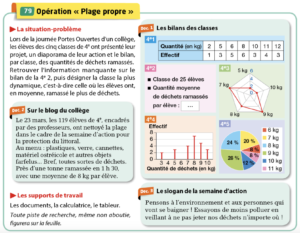The Lycée math curriculum is bilingual. How does this benefit students?
Bilingualism and biculturalism are two of our biggest assets, as math educators. On the one hand, the French math tradition is very strong, and even world-renowned. It is well-designed to lay groundwork for understanding theoretical concepts, pure math, and reasoning skills—which build a strong foundation for our students. The traditional French curriculum integrates a lot of geometry, for example, as well as algebra and calculus. Instead of taking Algebra I and then Algebra II, the French math curriculum progresses cyclically through concepts, going more in-depth each time. That is good preparation for the real world, as it provides ways to look at problems from different angles.
 On the other hand, the American approach to math is concrete and practical, with a bigger focus on statistics and data analysis. Also importantly: there are many great job opportunities in the American tech and finance sectors that do not exist anywhere else—in Silicon Valley, and on Wall Street. We aim to set students up for success in these industries, if they choose to pursue them.
On the other hand, the American approach to math is concrete and practical, with a bigger focus on statistics and data analysis. Also importantly: there are many great job opportunities in the American tech and finance sectors that do not exist anywhere else—in Silicon Valley, and on Wall Street. We aim to set students up for success in these industries, if they choose to pursue them.
In the end, because Lycée students are steeped in the French math tradition that integrates some aspects of an American program, especially to help students adapt and prepare for US standardized tests like SATs or ACTs, they come out with a broad experience in math, and perhaps a bigger toolkit for their studies afterwards. If you will allow me to make a math pun: bilingual education adds up to more than the sum of its parts. A school that helps students master both French and American approaches to math helps them think in many different creative ways. This is the kind of flexibility we are looking for in an international or bilingual program, and one that we think will truly benefit our students later in life.
How has the place of math in the French curriculum evolved over time?
The history of math education in France is fascinating. At the beginning of the 20th century, the French education system relied on the humanities (Latin and Greek, mainly), to seek out and recruit elite thinkers. But ultimately, this method for evaluating students was perceived as classist. It was based on access to a certain kind of culture—access to a certain kinds of books, and a certain appreciation for knowledge, which did not make room for social ascension from the working classes. So after WWII, math emerged as the way to democratize education, reducing the social gap in the recruitment of its elite. Suddenly, the most prestigious school in France was L’École Polytechnique. Suddenly, math was seen as a more efficient and fair way to build a meritocratic system.
Today in the computer age, math is as pervasive and necessary as ever. Most career paths rely on math as a fundamental building block, whether students will go into STEM, science, technology, coding, engineering, medicine, or not. They will certainly be filing tax returns, and making financial decisions that impact their personal and professional futures. If students go into business, they may well manage a team of IT engineers or review P&L statements, plan budgets, and even manage risk.
So it is important for them to be able to communicate and express themselves inside a mathematical framework. As educators, one of our goals is simply to teach students how to have this relationship with knowledge.
What math skills are important in the 21st century?
In jobs of the future, young leaders and innovators will need to be able to think on their feet and wear many hats at once. It is no longer enough to make students solve routine calculations out of a textbook. Instead, students need to practice problem-solving skills that will prepare them for the real-life job scenarios of today and tomorrow.
At the Lycée, we give students open-ended puzzles—scenarios where they are urban planners who must design roads for traffic; architects who must erect bridges; and space engineers who must launch satellites. In challenges like this, students learn to gather information from a real-world environment, analyze the data, and make connections. They need to be able to prove why their solution will work. So they learn to use logic to convince each other.
They build robots, and use complex coding languages like Python to program the robots to solve mazes. They have contests, like “math sans frontières.” They use 3D shapes and software to make designs for toys and keychains, which then get printed with our 3D printer. Our students design their own tessellations, and make stained glass windows.
What is the place of math in the new curriculum for the French Bac?
Math is an essential subject for all Lycée students, and we have made a point for all the reasons we’ve been discussing of making sure every student, regardless of their area of interest or plans, take math at least through Première, and are strongly encouraged to take it all the way through Terminale. However, Lycée students will have two options. Those students who are passionate about math or who excel in math can continue to study for specialty “Math Bac” focus, which is an extraordinary preparation for math at the college level. Students who may not wish to pursue high-level math in college will have the opportunity to take a track called College Prep math. This option allows students to keep doing enough math to meet college requirements, while allowing them to pursue other interests.
Aside from test preparation, why is math important to learn?
There are millions of beautiful reasons to do math. Everyone needs to have the basic level of math to make informed decisions, first of all. Besides that, math in itself is a language. When you can master this language, you are in a space where you are free exercise your own creativity. There is a mathematical elegance to be explored in one’s thinking, and to express solutions. Math takes practice and rigor, but it is fun to do, too. Just ask any of our math team teachers…!
About the Author :
Originally from Alsace, Nicolas L’Hotellier has been the Assistant Head of School at the Lycée since 2009. After obtaining a master’s degree in mathematics and a teaching diploma, he taught for five years in France and then served as Assistant Principal in a collège and a lycée. In 2008, he obtained a master’s in management specializing in the administration of public educational organizations. He likes to foster students’ curiosity and encourages respect for others in all students. Nicolas is married and the father of two boys.


